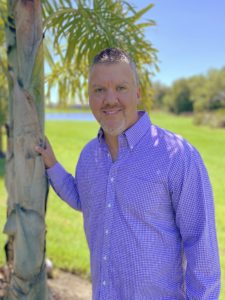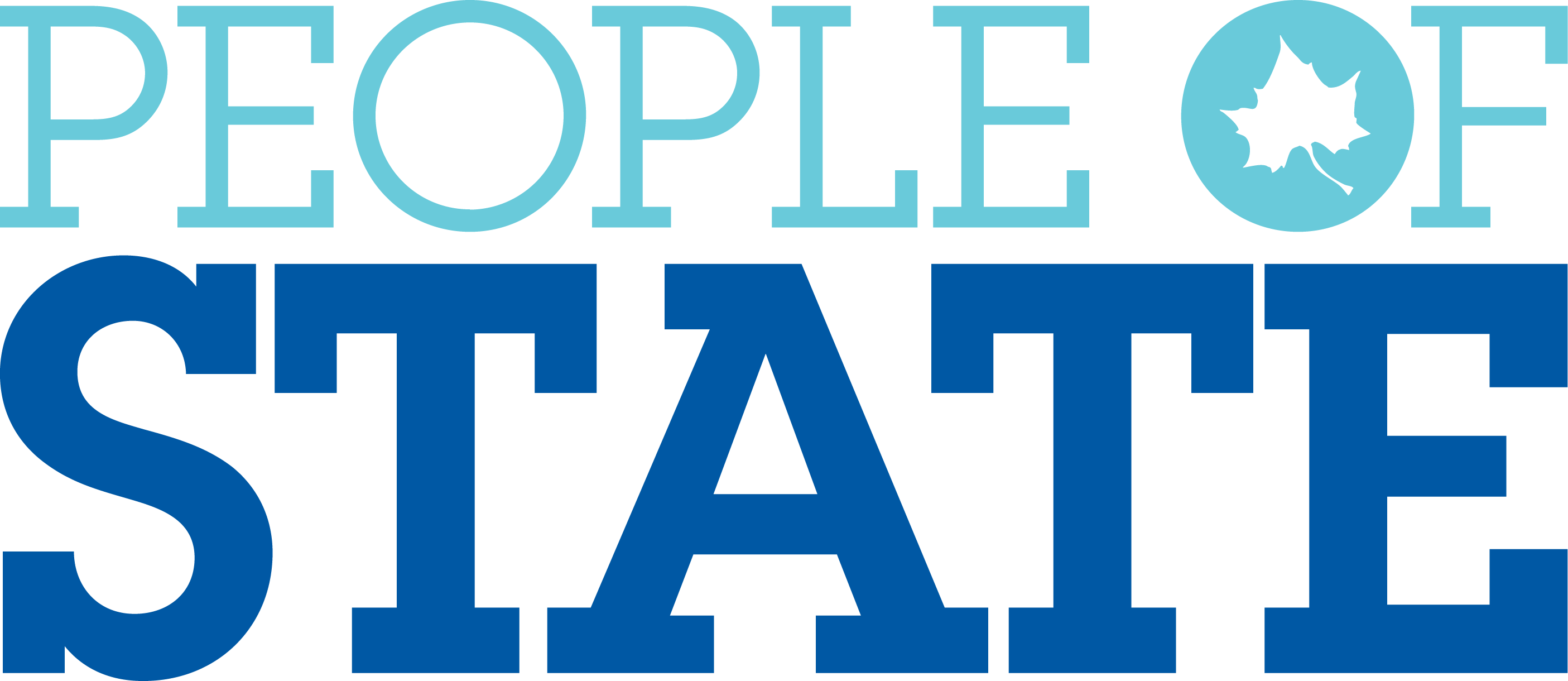Nate Davis
By University Marketing
May 1, 2020
How many of us, especially those of us approaching middle-age, look back on our youthful idealism with envy? How many of us, if given the chance to sit down with our younger selves, would do so in rapt attention, making every effort to bottle-up some of that youthful optimism and self-assurance as if it were a cluster of pennies in a jar?
By contrast, how many of us would instead try to “talk some sense” into that younger soul, to maybe replace that reckless naivety with a dose of much needed skepticism?
 If Nate Davis harbors any cynical notions, he doesn’t convey them. Not at all. If anything, Davis, who graduated from Indiana State University more than two decades ago, still carries himself like the young man he was on campus. Sure, when he discusses the economic realities that he sees on the ground as a development executive for Apple, Inc., he speaks with a tone of pragmatic realism. And yes, when he talks about the need for “equity of opportunity” for the nation’s students and young people, he makes it clear that this is not an easy problem to fix.
If Nate Davis harbors any cynical notions, he doesn’t convey them. Not at all. If anything, Davis, who graduated from Indiana State University more than two decades ago, still carries himself like the young man he was on campus. Sure, when he discusses the economic realities that he sees on the ground as a development executive for Apple, Inc., he speaks with a tone of pragmatic realism. And yes, when he talks about the need for “equity of opportunity” for the nation’s students and young people, he makes it clear that this is not an easy problem to fix.
But it takes little time to sense that the Nate Davis who now works with schools on behalf of Apple is the same Davis who booted pigskins for the Sycamore football squad every fall and dreamed of changing lives in the classroom.
“I work with school district leaders throughout the country,” Davis says explaining his duties at Apple. “[I help school leaders find ways] to be able to support and integrate technology into their districts, [and I work] to promote the concept and idea of digital transformation.”
“At Apple we believe that we create products that enrich people’s lives,” he says. “It is our belief within the education system that every student should have the opportunity to make an impact on the world.”
“[And] we see that most often when students are given the chance to be creators,” he adds: “Creators of their own content, creators of their own products.”
When Davis talks about this notion of “digital transformation,” he puts it in explicit, and very idealistic terms, which hearken back to his educational experiences as well as his training as an Indiana State University undergraduate. Like the tens of thousands of ISU education majors who preceded him, Davis had his future narrative arc fairly pegged down. And when he began his teaching career, he was well on his way to making that vision a reality.
“I taught sixth-grade social studies,” Davis explains. “A lot of people find [that age group] challenging, but I really enjoyed working with middle school students.”
Eventually, Davis moved up from his teaching gig to a series of administrative positions in both the middle school and elementary school settings before spending his final half-dozen years in public education as an assistant superintendent.
“One of the things that I’ve enjoyed about that career is that I served in multiple roles in different levels,” he says. “That has provided me with an empathetic perspective. It’s allowed me to see a school system through different lenses, and it’s allowed me to see the strengths and weaknesses of both an individual school and a complete district.”
“I was always grateful [for that perspective],” he adds, “because I think that sometimes when you have taught (or have been an administrator) at one [specific] level (or at one [specific] school) for a long time, it tends to make it very difficult to see how issues exist outside of your four walls.”
When Apple approached Davis with the opportunity to work in the private sector, he found that his training at ISU and his experiences in the public-school setting proved crucial elements in making the transition successful.
“I would equate [making that switch] to drinking from a firehose,” Davis says. “You have to possess a growth mindset, and you have to be a life-long learner in order to embrace that move.”
“There are so many things that are different about moving from a public sector, not-for-profit, to the world’s largest company,” he continues, “and arguably one of the world’s best companies, which obviously has its own culture.”
“So, any time you move from one culture—especially one you have been a part of for a long period of time—to a new one, you really have to spend time getting to know and understand both new systems surrounding you, but also the new culture, too,” Davis adds.
“The transition for me was relatively easy,” he concludes, “because I came to Apple because of what Apple stood for, for its value system, and for its core beliefs. When those core beliefs not only resonated with my professional worldview but my personal one as well, it made my transition into the culture of the company that much easier.”
Of course, verbalizing such an attitude is one thing. Living it, however, is an entirely different breed of duck. Davis is quick to credit his growth mindset to the leadership and instruction he received at the graduate school level from Dr. Terry McDaniel, professor of educational leadership in the Bayh College of Education. It is McDaniel, as Davis notes, who “provided a solid foundation to truly understand how to empathize and work with people who come from different places.”
And as valuable as his classroom experiences were, Davis further credits his development to his time spent on the football field, in particular he cites the bonds he established with then head coach Dennis Raetz and then assistant coach Mark Smith.
“I have seen the importance of coaching and mentoring play an enormous role in my career, and what I do on a day-in and day-out basis,” Davis, a West Terre Haute native, explains when asked about his career as a punter and kicker for the Sycamores.
“When you’re a student-athlete, and you’re being coached (and especially when you’re being, what I call, ‘coached hard’), sometimes it’s difficult to see the ‘Why?’ behind what’s going on,” he continues. “As I have gotten older, and as I’ve moved away from competitive athletics, what I have noticed is that the things which have held true with me are the importance of building that ‘coaching-and-mentoring’ trust with the people who you are trying to serve.”
This paired combination of service and trust are critical for Davis’ day-to-day work. As he travels the nation working with school leaders, he does so in a pointed moment in the history of American public schooling. In this always political, often seismically shifting, landscape Davis offers a thoughtful answer when asked where he sees the future of “school” going:
“The market-based education system in this country is predicated on this idea of ‘choice,’” Davis says. “On the positive side, it’s made schools and districts become much more innovative. I’ve seen the investment that districts and communities are putting into their schools and their students.”
“The negative is that it’s created an equity issue,” he adds. “And this becomes pervasive in a lot of different ways, because as this competitive landscape continues to escalate, we see places that have means being able to develop much more quickly, and at a faster rate, than other place which lack those means.”
“There’s no reason why, when I’m down here in Miami, where I see a school that would absolutely bring you to tears, but after a five-minute drive I’m in a school that looks like the Taj Mahal,” Davis explains. “I don’t question people’s intent. I think most of the people involved are all trying to be innovative and do the right things and improve the system.”
By this point, it goes without saying that Davis is not one to shirk from the negatives. As a teacher, as an administrator, and now as a tech executive Nate Davis has approached life with the clear understanding that problems exist, and that we should square up and tackle them. To do so, as Davis has made abundantly clear, a good leader has to prove to everyone around him that he can be counted on.
“When people trust you,” he says, “when they feel that you are listening, and when they feel that you are there to help and to serve you create a strong possibility to affect people in a positive way.”

